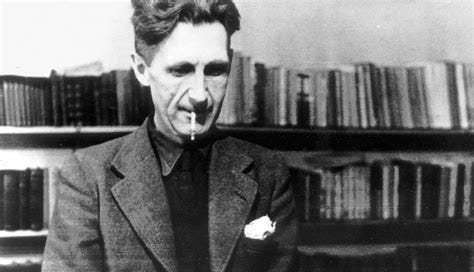When figuring out who to write about for this Democratic Thinkers post I asked a fellow political scientist their opinion on George Orwell. They agreed that Orwell would be a creative choice while still meeting the requirements of being a democratic thinker. During our conversation, they brought up a great point that I had to include.
“Many of Orwell’s works are bastardized and interpreted as blanket criticisms of ‘government overreach,’ or socialism rather than totalitarianism.”
Although George Orwell is not technically considered a democratic theorist, his works often critiqued totalitarianism and resonated with democratic values. This British writer is best known for his novels Animal Farm and 1984; where both of which were dystopian novels against totalitarianism. 1984 explores themes of censorship in a society where truths are manipulated to favor the government. This idea of freedom of speech aligns with John Locke’s emphasis on personal liberty, which is essential to a democracy. The novel Animal Farm explores the ways authoritarian leaders exploit revolutionary principles. This corruption goes hand and hand with Tocqueville’s warnings about the descent into despotism for democracies. Both novels examine how fragile democratic systems can be, becoming a cautionary tale for democratic governments.
Influences
Orwell’s experiences with the working class gave material and inspiration for some of his earlier novels, such as Down and Out in Paris and London. By working multiple low-paying jobs, Orwell observed the neglect and exploitation of the lower working class. These experiences had Orwell reevaluate his political orientation and discovered he aligned with socialist ideas, specifically regarding systematic inequality.
It is clear that the rise of fascist governmental powers during that period not only inspired Orwell but was also significantly influenced by H.G. Wells and his book, The War of the Worlds. Which explores societal collapse when confronted with overwhelming power. Well’s literature likely supported Orwell's use of dystopian themes to political themes.
Orwell’s Contribution to Banned Books
Direct evidence of Margaret Atwood and Ray Bradbury drawing inspiration from Orwell is sparse, however, their works share striking thematic parallels. Authors Margaret Atwood and Ray Bradbury express many political critiques of government in their respective novels, The Handmaid's Tale and Fahrenheit 451. Atwood’s The Handmaid’s Tale dives into theocratic authoritarianism, mirroring Orwell’s warnings about the loss of individual freedoms. Bradbury’s Fahrenheit 451 critiques censorship and the devaluation of deep thought, themes central to 1984. These similarities suggest that Orwell’s critiques of totalitarianism have left an enduring legacy in literature.

Authoritarian governments are still present providing challenges for political theorists; George Orwell’s work provides a unique and (unfortunately) realistic insight into totalitarianism. Orwell’s work highlights the inner workings of total control, from propaganda to extensive surveillance. The framework laid out in his literature provides an understanding of the threats to democracy, making his work still relevant today.





Good! But who is that quote from?
Also make sure to include a caption and photo credit for that first photo.